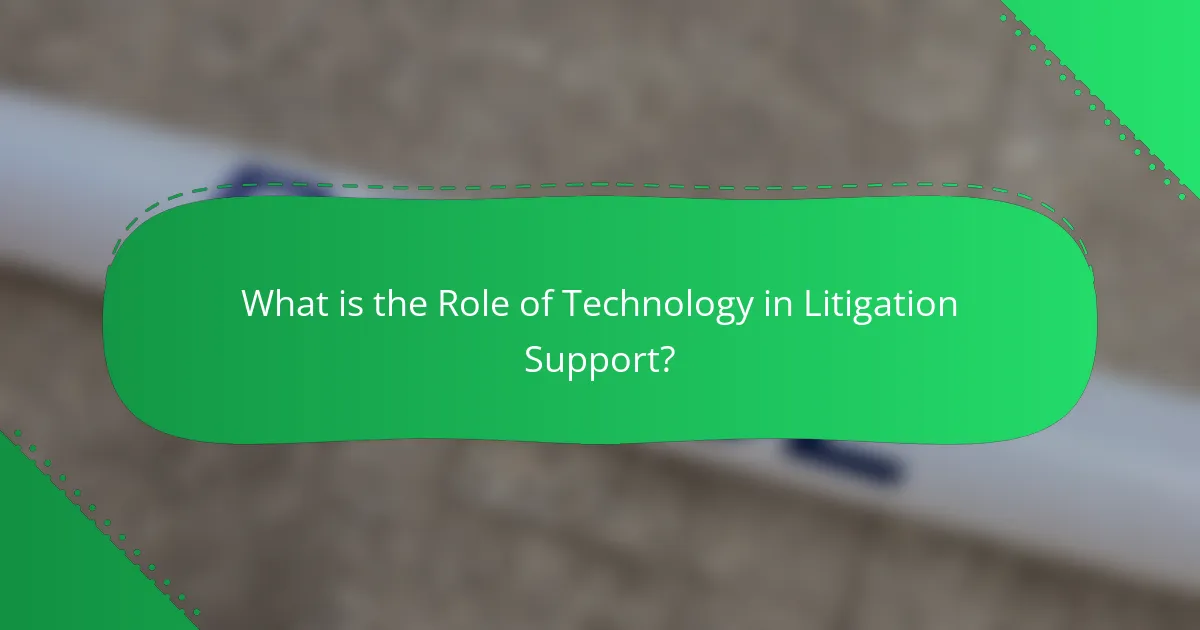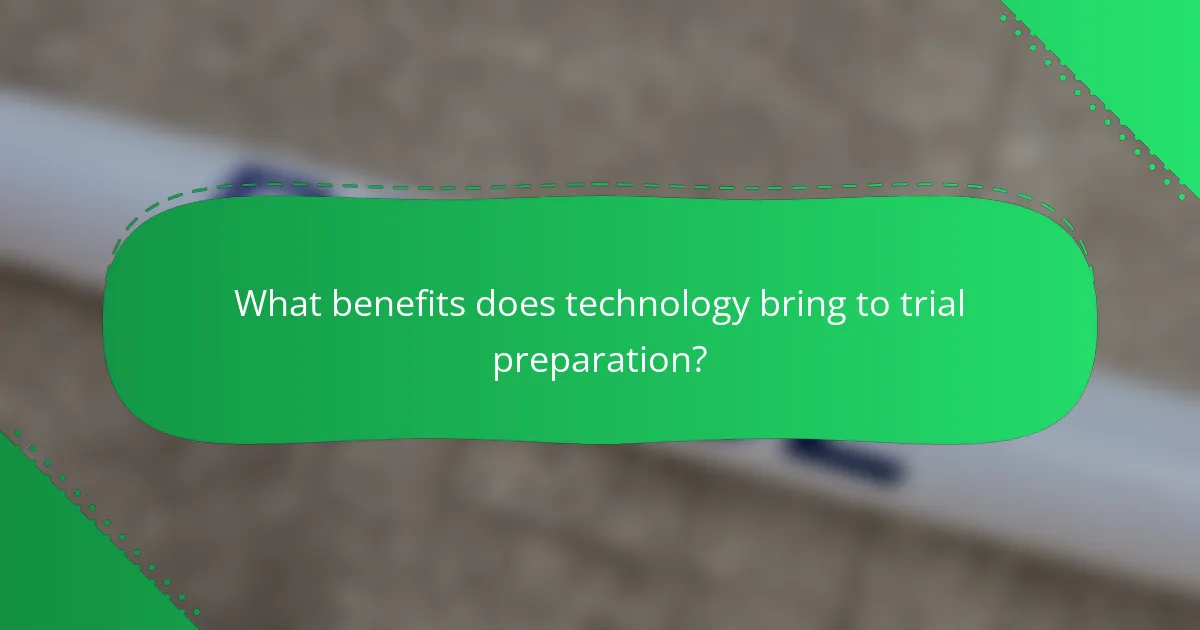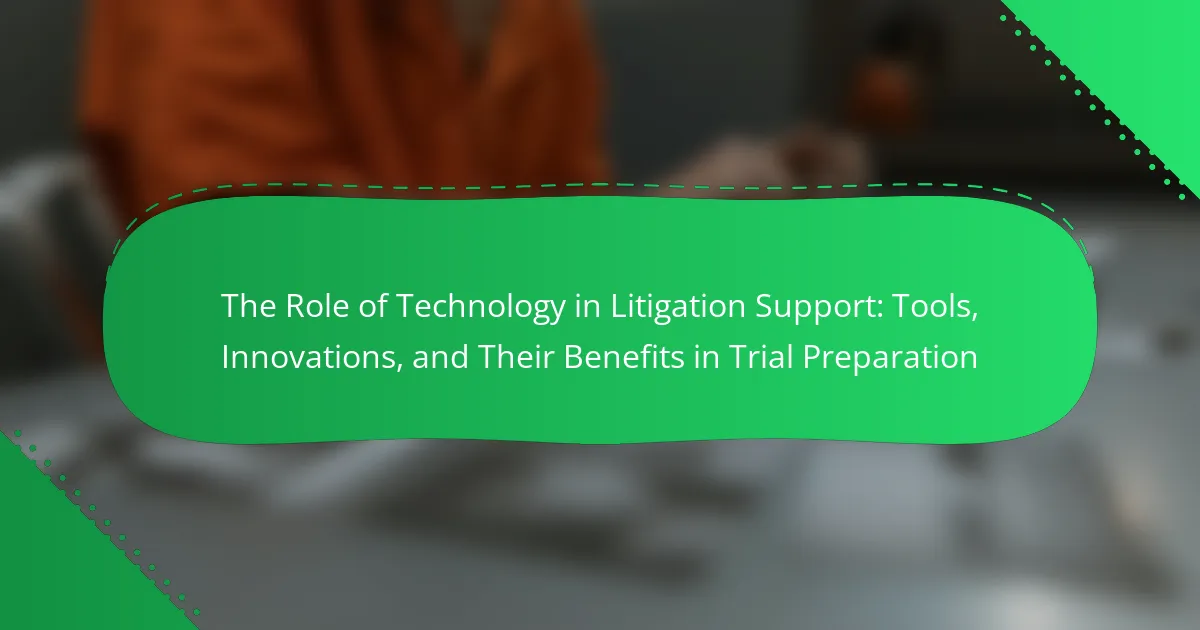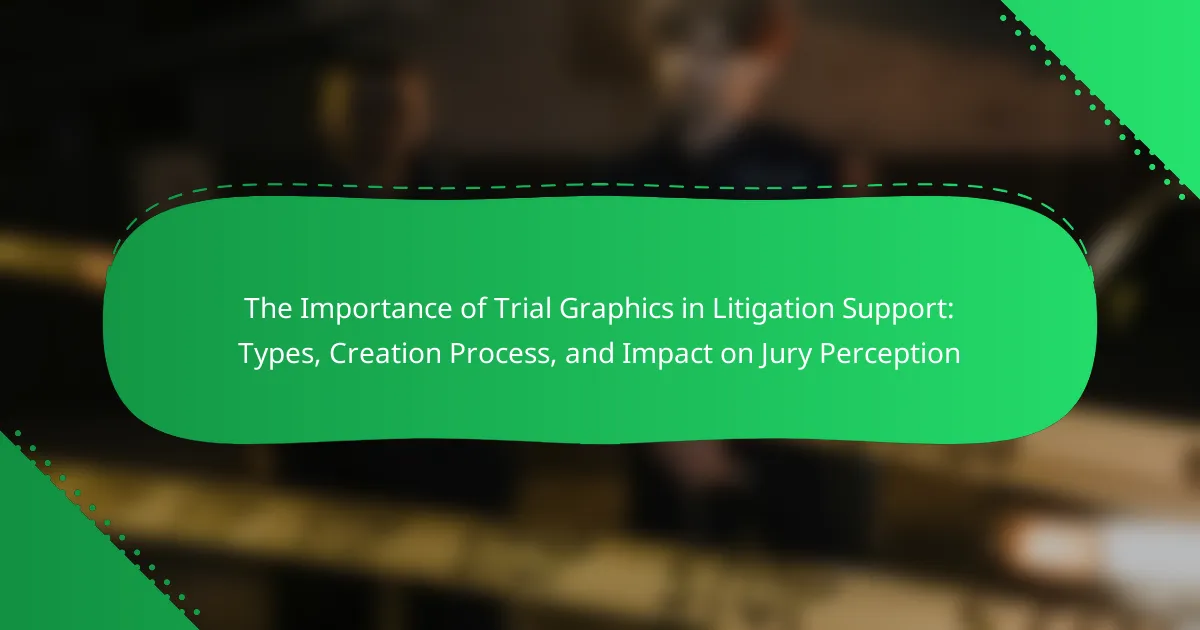Technology is a vital component in litigation support, significantly improving the efficiency and accuracy of legal processes. Key tools such as e-discovery software, case management systems, and document review platforms facilitate the management of extensive data and documentation, enhancing collaboration among legal teams. These innovations streamline trial preparation by enabling quick retrieval of information, real-time communication, and effective evidence presentation. The integration of technology not only optimizes case management but also contributes to better client outcomes by allowing legal professionals to leverage analytics for predicting case results. Overall, technology transforms the litigation landscape, making trial preparation more organized and effective.

What is the Role of Technology in Litigation Support?
Technology plays a crucial role in litigation support by enhancing efficiency and accuracy in legal processes. It facilitates the management of vast amounts of data and documentation. Tools such as e-discovery software streamline the identification and retrieval of relevant information. Document management systems organize case files and improve collaboration among legal teams. Technology also enables real-time communication, allowing lawyers to share updates instantly. Additionally, analytics tools assist in predicting case outcomes based on historical data. A study by the American Bar Association found that 90% of legal professionals use technology to improve their practice. This integration of technology ultimately leads to more effective trial preparation and better client outcomes.
How has technology transformed litigation support?
Technology has significantly transformed litigation support by enhancing efficiency and accuracy. Electronic discovery (e-discovery) tools streamline the process of gathering and reviewing documents. These tools can process vast amounts of data quickly, reducing the time lawyers spend on document review. Legal research databases have made it easier to access case law and legal precedents. Advanced analytics can identify patterns and trends in litigation, aiding strategy development. Communication tools facilitate collaboration among legal teams, regardless of location. Cloud-based platforms allow for secure storage and sharing of sensitive information. Overall, technology has increased the speed of litigation processes and improved outcomes for clients.
What are the key technological advancements in litigation support?
Key technological advancements in litigation support include e-discovery tools, document management systems, and case management software. E-discovery tools streamline the process of identifying, collecting, and reviewing electronic evidence. These tools can analyze large volumes of data quickly, significantly reducing the time needed for discovery. Document management systems enhance organization and retrieval of case documents. They allow legal teams to collaborate efficiently and maintain version control. Case management software integrates various aspects of litigation, including scheduling, task management, and communication. This integration improves overall case strategy and coordination. Additionally, artificial intelligence is being used to predict case outcomes and assist in legal research. These advancements contribute to greater efficiency and accuracy in litigation processes.
How do these advancements improve trial preparation?
Advancements in technology significantly improve trial preparation by enhancing efficiency and accuracy. Digital tools streamline document management, allowing for faster retrieval and organization of case files. Advanced analytics provide insights into case patterns and trends, aiding in strategy development. Virtual simulations enable trial teams to practice and refine their arguments in realistic settings. Collaboration platforms facilitate communication among team members, ensuring everyone is aligned on case details. Additionally, technology aids in jury selection through data-driven methods, increasing the likelihood of favorable outcomes. These improvements collectively lead to better-prepared legal teams and more effective presentations in court.
Why is technology essential in modern litigation processes?
Technology is essential in modern litigation processes because it enhances efficiency and accuracy. It streamlines document management, allowing for quick retrieval of relevant information. Tools like electronic discovery simplify the review of large volumes of data. Technology also aids in communication between legal teams and clients, improving collaboration. Moreover, case management software organizes case files and deadlines effectively. According to a 2020 report by the American Bar Association, 75% of lawyers believe technology improves their practice. Overall, technology transforms litigation into a more manageable and precise process.
What challenges does technology address in litigation?
Technology addresses several challenges in litigation, including document management, data analysis, and communication. Document management systems streamline the organization of large volumes of evidence. This reduces the time spent searching for relevant documents. Data analysis tools assist in identifying patterns and trends within case data. This enhances the strategic planning of legal arguments. Communication platforms improve collaboration among legal teams and clients. They facilitate real-time updates and information sharing. Additionally, technology enhances accessibility to legal resources and case law. This allows for more informed decision-making. Overall, technology increases efficiency and accuracy in litigation processes.
How does technology enhance collaboration among legal teams?
Technology enhances collaboration among legal teams by providing tools that facilitate communication and information sharing. Cloud-based platforms enable real-time document access and editing. This allows team members to work simultaneously on case files from different locations. Project management software helps organize tasks and deadlines effectively. Video conferencing tools enable face-to-face discussions without geographical constraints. Secure messaging applications ensure confidential communication among team members. These technological advancements lead to increased efficiency and faster decision-making. Studies show that legal teams using collaborative technology report higher satisfaction and better outcomes in case management.

What tools are commonly used in litigation support?
Common tools used in litigation support include e-discovery software, case management systems, and document review platforms. E-discovery software helps in managing electronic documents and data retrieval. Case management systems organize case information and facilitate collaboration among legal teams. Document review platforms streamline the process of reviewing and analyzing large volumes of documents. Additionally, trial presentation software aids in creating visual aids for courtroom presentations. These tools enhance efficiency and accuracy in managing litigation processes. Their usage is widespread among legal professionals to improve trial preparation and case management.
What are the main categories of litigation support tools?
The main categories of litigation support tools include document management, e-discovery, case management, trial presentation, and legal research tools. Document management tools help organize and store legal documents efficiently. E-discovery tools facilitate the identification and collection of electronically stored information. Case management tools assist in tracking case progress and deadlines. Trial presentation tools enhance the visual display of evidence during trials. Legal research tools provide access to statutes, case law, and legal precedents. Each category plays a crucial role in streamlining the litigation process and improving efficiency.
How do document management systems function in litigation support?
Document management systems (DMS) function in litigation support by organizing, storing, and retrieving legal documents efficiently. They allow legal teams to manage large volumes of information during litigation. DMS provides features such as version control, ensuring that the most current document is accessible. They also facilitate collaboration among team members by enabling simultaneous access to documents. Search functionalities help locate specific files quickly, saving time in the discovery process. Furthermore, DMS enhances security by implementing access controls and tracking document changes. These systems are crucial for maintaining compliance with legal standards and managing deadlines effectively. Overall, DMS streamlines the litigation process, improving productivity and accuracy in trial preparation.
What role do e-discovery tools play in trial preparation?
E-discovery tools play a critical role in trial preparation by streamlining the process of gathering and analyzing electronic evidence. These tools enable legal teams to efficiently search through large volumes of data. They help identify relevant documents, emails, and other digital communications. E-discovery tools also assist in organizing evidence for easy access during trial.
Moreover, they support the review process by employing advanced algorithms and machine learning. This technology can prioritize documents based on relevance, saving time and resources. Additionally, e-discovery tools ensure compliance with legal standards for evidence handling. Their use can significantly enhance the overall effectiveness of trial preparation.
What innovations are shaping the future of litigation support?
Artificial intelligence and machine learning are revolutionizing litigation support. These technologies enhance document review processes by automating the identification of relevant information. Predictive coding is a key application, allowing systems to learn from previous cases. This increases efficiency and reduces the time spent on manual reviews. Data analytics tools are also crucial for analyzing case trends and outcomes. They provide insights that help legal teams strategize effectively. Cloud-based platforms facilitate collaboration among legal professionals, making access to documents easier. Blockchain technology offers secure methods for storing and sharing sensitive information. These innovations collectively streamline litigation processes and improve overall case management.
How is artificial intelligence being utilized in litigation support?
Artificial intelligence is utilized in litigation support to enhance efficiency and accuracy in legal processes. AI tools assist in document review by quickly analyzing large volumes of data. They can identify relevant information, reducing the time lawyers spend on discovery. AI algorithms also predict case outcomes based on historical data, aiding in strategy formulation. Additionally, AI-powered legal research tools streamline the process of finding pertinent case law. By automating routine tasks, AI allows legal professionals to focus on complex legal issues. Studies show that AI can improve the speed of litigation processes by up to 70%. These advancements demonstrate AI’s significant impact on the legal field.
What impact do cloud-based solutions have on trial preparation?
Cloud-based solutions significantly enhance trial preparation by providing real-time access to documents and data. These solutions allow legal teams to collaborate efficiently from different locations. They streamline the organization of case materials, making it easier to manage large volumes of information. Cloud platforms often include advanced search functionalities, which expedite the retrieval of relevant documents. Additionally, they facilitate secure sharing of sensitive information among team members. According to a study by the American Bar Association, 70% of attorneys reported improved productivity after adopting cloud technologies. This indicates that cloud-based solutions are crucial for modern trial preparation.

What benefits does technology bring to trial preparation?
Technology enhances trial preparation by improving efficiency, accuracy, and accessibility of information. It streamlines document management through digital filing systems. These systems allow for quick retrieval and organization of case files. Technology also facilitates collaboration among legal teams via cloud-based platforms. This enables real-time sharing and editing of documents. Additionally, technology aids in evidence presentation through visual aids and multimedia. These tools can make complex information more understandable for juries. Moreover, legal research software accelerates the process of finding relevant case law and statutes. This can significantly reduce the time spent on preparation. Overall, technology transforms trial preparation into a more organized and effective process.
How does technology improve efficiency in litigation support?
Technology improves efficiency in litigation support by automating various processes. Automation reduces the time spent on document review and discovery. For instance, e-discovery tools can analyze large volumes of data quickly. This capability allows legal teams to identify relevant information faster. Additionally, case management software streamlines communication among team members. It centralizes case documents and updates in one accessible location. Another improvement comes from legal research tools that provide instant access to case law. These tools enhance accuracy and reduce the time required for legal research. Overall, technology significantly accelerates workflows in litigation support, leading to increased productivity and cost savings.
What time savings can be expected from using technology in trial preparation?
Technology can save significant time in trial preparation. Automated document review can reduce preparation time by up to 80%. E-discovery tools streamline the process of gathering and analyzing evidence. Case management software organizes information efficiently, minimizing the time spent on administrative tasks. Legal research platforms can provide instant access to relevant case law, cutting down research time drastically. Collaboration tools enhance communication among team members, reducing delays in information sharing. Overall, integrating technology into trial preparation leads to faster case readiness and improved efficiency.
How does technology reduce costs associated with litigation?
Technology reduces costs associated with litigation by streamlining processes and increasing efficiency. It automates routine tasks such as document review and discovery. This automation minimizes the time lawyers spend on these tasks. For instance, e-discovery tools can analyze large volumes of data quickly. This leads to significant savings in labor costs. Additionally, technology facilitates remote collaboration among legal teams. Virtual meetings reduce travel expenses and time delays. Cloud-based storage allows for easy access to documents, eliminating the need for physical storage. According to a report by the International Association for Legal Technology, firms using technology can reduce litigation costs by up to 30%.
What are the potential drawbacks of relying on technology in litigation support?
Relying on technology in litigation support can lead to several potential drawbacks. One significant issue is the risk of data breaches. Sensitive information may be exposed if cybersecurity measures are inadequate. Another drawback is the dependency on technology, which can lead to disruptions if systems fail. Technical issues can delay important processes, impacting case timelines.
Additionally, there is the potential for over-reliance on automated tools. This may result in overlooking critical details that require human judgment. Training requirements for staff can also pose challenges. Employees must be proficient with technology to use it effectively, which may require significant time and resources.
Moreover, technology can introduce complexity into workflows. This may create confusion among team members unfamiliar with new systems. Lastly, the cost of technology can be prohibitive. High initial investments and ongoing maintenance expenses may strain budgets.
What risks are associated with data security in litigation technology?
Data security in litigation technology poses several risks. These risks include unauthorized access to sensitive information. Cyberattacks can lead to data breaches and loss of confidential materials. Inadequate encryption may expose data during transmission. Misconfigured systems can create vulnerabilities for data leaks. Additionally, human error can result in accidental data exposure. Compliance failures with regulations can lead to legal repercussions. Finally, reliance on third-party vendors may introduce risks if their security measures are insufficient. Each of these risks highlights the importance of robust data security protocols in litigation technology.
How can over-reliance on technology impact legal outcomes?
Over-reliance on technology can negatively impact legal outcomes by introducing errors and biases. When legal professionals depend heavily on automated systems, they may overlook critical nuances in cases. For instance, algorithmic biases can lead to unfair outcomes if the technology is not properly calibrated. Additionally, technology failures can result in lost evidence or delayed proceedings. A study by the National Center for State Courts found that reliance on technology can exacerbate disparities in access to justice. These factors demonstrate that while technology can enhance efficiency, excessive dependence may compromise the integrity of legal processes.
What best practices should be followed when implementing technology in litigation support?
Best practices for implementing technology in litigation support include thorough needs assessment, careful vendor selection, and robust training programs. Conducting a needs assessment identifies specific requirements for the case. Selecting the right vendor ensures compatibility with existing systems and user needs. Training programs enhance user proficiency and adoption of the technology. Regularly updating software and hardware maintains security and efficiency. Establishing clear communication protocols facilitates collaboration among team members. Implementing data backup solutions protects against data loss. Finally, evaluating technology effectiveness through feedback helps refine processes and tools.
How can legal teams effectively choose the right tools for their needs?
Legal teams can effectively choose the right tools by assessing their specific needs and objectives. They should start by identifying the types of cases they handle and the tools required for each. Next, they should evaluate the features of potential tools, such as case management, document automation, and collaboration capabilities. Cost is also a critical factor; teams must ensure that the tools fit within their budget constraints. User-friendliness is essential, as tools should be intuitive for all team members. Additionally, teams should consider integration capabilities with existing systems. Finally, seeking feedback from other legal professionals can provide insights into the effectiveness of tools. This structured approach helps ensure that legal teams select tools that enhance their efficiency and effectiveness in litigation support.
What strategies can enhance the integration of technology in trial preparation?
Implementing comprehensive training programs enhances the integration of technology in trial preparation. These programs ensure that all team members understand the tools available. Regular training sessions can improve user proficiency and confidence. Additionally, fostering collaboration between legal teams and IT professionals promotes effective technology use. Establishing clear protocols for technology usage streamlines processes and reduces errors. Utilizing cloud-based platforms allows for real-time document sharing and updates. Integrating case management software improves organization and tracking of trial materials. Collectively, these strategies lead to more efficient trial preparation and better outcomes.
The main entity of the article is technology in litigation support. The article outlines the critical role of technology in enhancing efficiency and accuracy within legal processes, detailing key tools such as e-discovery software, document management systems, and case management software. It discusses how technological advancements improve trial preparation through better document organization, real-time collaboration, and data analysis. Additionally, the article highlights potential challenges and best practices for implementing technology in litigation, emphasizing its impact on reducing costs and improving legal outcomes.



